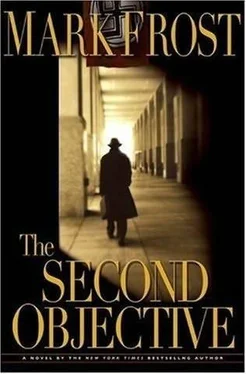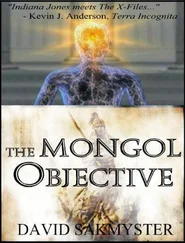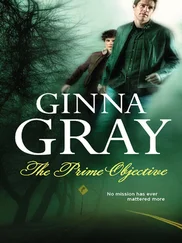Security officers tried using human bait to draw the killers into the open. One of Eisenhower’s staff officers, Lieutenant Colonel Baldwin Smith, who bore a striking resemblance to his balding commander, volunteered to move into Eisenhower’s vacated villa. For the next few days he dressed in one of the general’s uniforms and was driven back and forth in the general’s Cadillac along his normal travel routes. Eisenhower himself was neither asked nor told about the substitution.
The fallout from Lieutenant Schmidt’s confession affected Allied soldiers all along the chain of command. Although he gave the correct password at a checkpoint, American General Bruce Clarke spent six hours in custody when an overeager MP decided that the general’s placing of the Chicago Cubs in the American League constituted proof he was a German spy. Driving back to his own headquarters, General Omar Bradley was stopped half a dozen times and grilled on Midwestern geography, the Notre Dame football team, and the infield of the St. Louis Cardinals.
British Field Marshal Bernard Montgomery, just arriving in Belgium from Holland, was waved down at an American roadblock near Malmédy. As a security precaution, all rank and insignia had been removed from his jeep, which aroused suspicion. Furious at having his authority questioned, particularly by an American, the imperious Montgomery ordered his chauffeur to drive on in the middle of the conversation. MPs responded by shooting out his tires, giving chase, and relieving Montgomery of his sidearm. They held the war’s highest-ranking British officer in custody for three hours, until a Canadian colonel identified the apoplectic Montgomery. Exasperated by Monty’s habitual grandstanding, Eisenhower reportedly relished hearing about his ordeal in detail.
Soldiers manning the checkpoints were no longer satisfied with passwords, and as the days wore on, their interrogations grew increasingly elaborate. Queries about sports, comic strips, and current Hollywood gossip supplied the most frequent stumpers. Some inventive MPs tried to trip up the putative assassins by demanding they recite poems filled with r’s or w’s, notoriously difficult for native Germans. “Round the rugged rock the ragged rascal ran” was a favorite.
For all the disruption they caused, these precautions were about to pay tangible dividends.
The French Border
DECEMBER 18, 9:00 P.M.
After driving all afternoon, Earl Grannit and Ole Carlson entered France at a heavily guarded crossing just north of the town of Givet. Grannit identified himself to MPs running the post and made sure they’d received the bulletin about Skorzeny’s commandos. They showed him that it had been widely circulated and that more stringent controls had been imposed. Traffic was backed up on the Belgian side of the border for a quarter of a mile.
Before pushing on for Reims, Grannit and Carlson were shown to the mess hall next door for a quick meal. Waiting for their food, they drank coffee by a window looking out on the post’s supply depot on the French side of the line.
“You got a wife, Earl?”
“What do you want to know for?”
“I don’t know, I just never asked you.”
“I had one,” said Grannit.
Carlson waited. “That’s it?”
“Yup.”
“What did your dad do?”
“He owned a gas station,” said Grannit.
“Any brothers or sisters?”
“What is this, the third degree?”
“I’m just making conversation.”
“I had a sister.” Grannit spotted something out the window. “You got your binoculars with you?”
Carlson handed them over. Grannit focused them on an American jeep at a gas pump in the supply depot a quarter of a mile away. Two MPs stood near the jeep, one of them dispensing gas into the tank. From this distance and angle he couldn’t make out any unit numbers on the jeep.
“Go ask at the post if a couple of MPs came across in the last hour.”
“You got it.”
Carlson immediately went next door to the border command office.
Grannit watched the MPs at the gas pump. He scanned the vehicle, looking for details that reminded him of Schmidt’s jeep. Nothing jumped out. Carlson returned a few moments later.
“They came through about twenty minutes ago,” said Carlson. “They had the password and SHAEF passes-”
“Did they check the spelling?”
“He said they had that detail from our bulletin, and that ‘headquarters’ was spelled correctly. They said they were from SHAEF, working security on the Skorzeny case.”
“So they knew about it, mentioned it before they were asked.”
“That’s what he said.”
Grannit saw a third MP returning to join the others at the jeep in the yard. “Anyway, there’s three of them.”
“You thought it might be our guys?”
“No, Ole, I thought it was Eleanor Roosevelt,” said Grannit, lowering the glasses.
“You would’ve noticed her teeth,” said Carlson. “Even at this distance.”
Something caught Grannit’s eye just as the binoculars came down, and he drew them back up. A fourth MP came out of a side building and climbed into the jeep.
“Hang on, shit, there’s four of them.”
“But their passes were good.”
“Hold ’em up at the gate, we’ll check ourselves. Go now.”
Carlson hurried back to the post. Grannit hustled out the back of the mess hall into the yard and saw the jeep pull away from the gas pumps. It headed for the nearest exit, an open gate in a chain-link fence a hundred yards away. Heading after them, Grannit broke into a trot.
“Hurry up, Ole,” he said.
As the jeep approached the gate, Grannit saw an MP in the guard house pick up a phone. He stepped outside and rolled the gate shut as the jeep got close. The MP leaned over to say something to the men inside.
The jeep slammed into reverse, spun around, and headed back across the yard toward another exit, quickly reaching top speed. The MP ran after it. Grannit pulled his pistol.
“Hey! Hey!”
The jeep careened straight at Grannit. He lowered the pistol, and emptied the clip. Shots cracked the windscreen and side mirror, but the jeep steered away from him. Ole and MPs from the border post ran out of the main building with guns drawn and angled toward the gate across the yard. A machine gun on top of the post opened up, chasing the jeep with bullets across the yard but not connecting.
With no time to close the rolling gate at the far exit, two guards threw down a line of necklace mines across the opening. The jeep accelerated as it reached the open gate and hit the mines at fifty miles an hour. The mines detonated, blowing off the front tires. The full, oversized gas tank ignited in a fireball, flipping the jeep into the air. It landed upside down, enveloped in flames.
All four men aboard, including their squad leader SS Unterstürmführer Gerhard Bremer, died instantly.
Pont-Colin, Belgium
DECEMBER 19, 6:00 A.M.
Bernie Oster and Erich Von Leinsdorf spent the night huddled in their jeep, side flaps and canvas roof raised, wrapped in blankets. Bernie was still too cold to sleep. They had driven west from Bastogne until after dark, sticking to back roads; eighteen hours to cover fifty miles, across empty fields, through abandoned or devastated villages. Twice they pulled into heavy woods to avoid American reinforcements entering from France. Using binoculars, Bernie spotted the screaming eagle insignia of the 101st Airborne on their sleeves.
Snow fell steadily through the night, wrapping the forest in silence. For the first time since the offensive began, they’d left the frenzy of battle behind. At first light they rolled down to a heavily wooded ridge overlooking a minor border post that Von Leinsdorf had selected on the map. Through binoculars he spotted two French soldiers manning a kiosk and guard gate spanning the dirt road. No traffic moved in either direction.
Читать дальше












